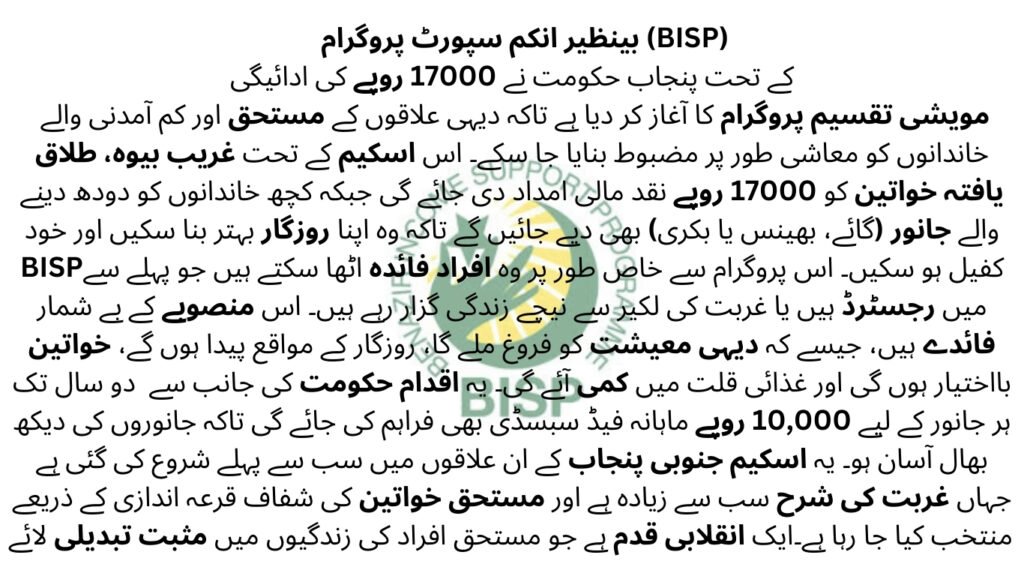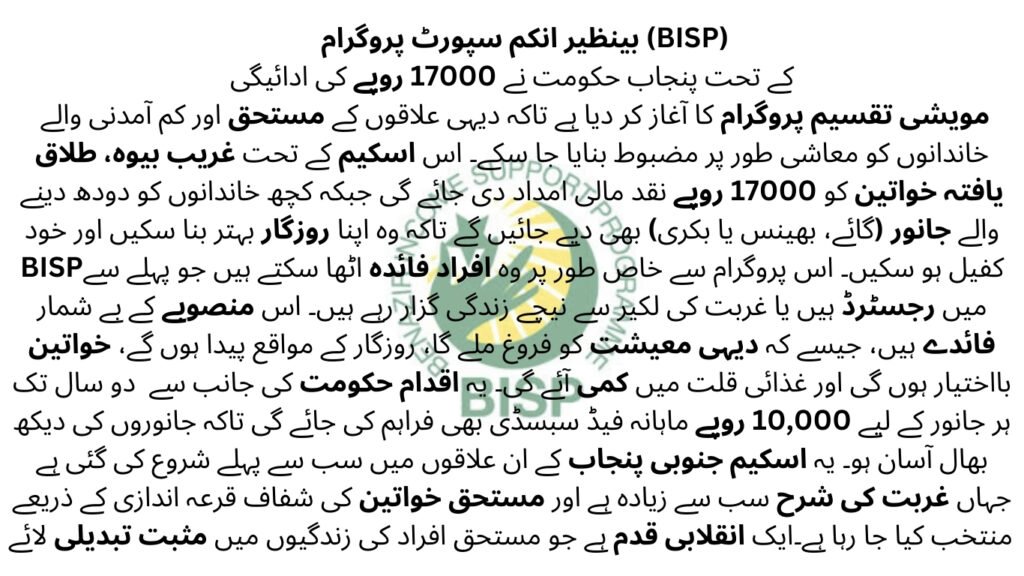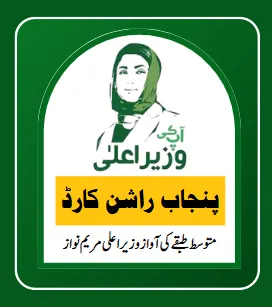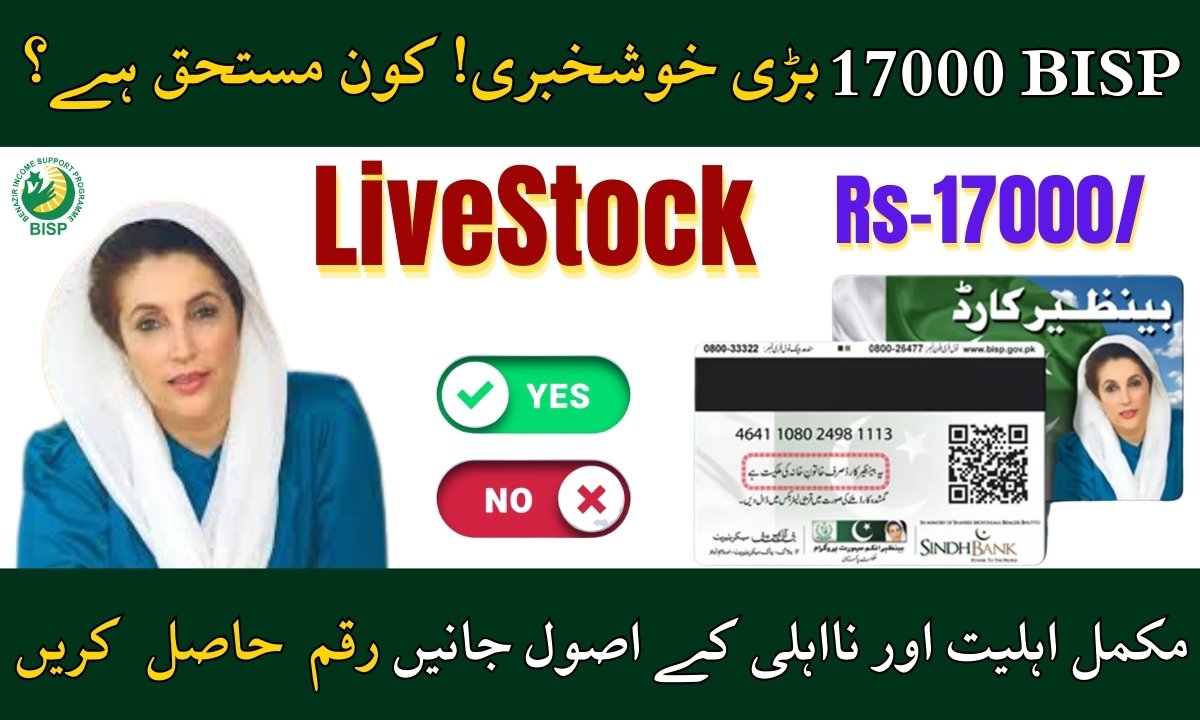The Government of Pakistan, BISP 17000 is under the 2025 national budget, has launched a groundbreaking initiative to empower rural communities and strengthen the agricultural sector. This initiative, known as the BISP 17000 Livestock Distribution Scheme, falls under the umbrella of the Benazir Income Support Programme (BISP), one of the country’s largest social welfare programs. This scheme is specifically designed to uplift low-income rural families by providing them with free livestock animals, including goats, cows, and buffaloes. By distributing livestock to deserving households, the government aims to create new income streams for families who rely on agriculture and livestock farming as their primary source of livelihood. The core objective of this program is to fight poverty, improve food security, and promote women’s economic empowerment in Pakistan’s rural areas. Many poor families, especially those headed by women, struggle to make ends meet due to limited access to resources and job opportunities. For these households, owning livestock can mean the difference between survival and progress.
Livestock farming not only provides a consistent supply of milk, meat, and dairy products for household consumption but also opens avenues for selling these goods in local markets. This additional income helps families afford necessities such as healthcare, children’s education, and utility bills. The government believes that investing in rural households through this scheme will create a ripple effect, improving nutrition levels, enhancing financial independence, and ultimately reducing the poverty ratio in Pakistan. To ensure the program benefits only the most deserving families, the eligibility and ineligibility criteria have been clearly defined. This transparent process is being implemented through the Dynamic National Socio-Economic Registry (NSER) Survey and the 8171 BISP Portal. These measures will verify applicants and ensure livestock reaches households that lack other significant means of income or support.

Key Highlights of BISP 17000 Livestock Eligible Criteria
| Feature | Details |
| Year | 2025 |
| Scheme Name | BISP 17000 Livestock Distribution |
| Target Beneficiaries | Rural poor families (priority to female-headed households) |
| Coverage | All provinces of Pakistan, with a focus on rural areas |
| Policy Status | Approved in Budget 2025 |
| Benefit Provided | Free livestock animals (goats, cows, buffalo) |
| Verification Process | Through the Dynamic NSER Survey & 8171 SMS/portal |
What Is the BISP 17000 Livestock Distribution Scheme?
The BISP Livestock Program 2025 is a poverty alleviation initiative that distributes livestock among underprivileged families. This initiative is tailored for rural communities where animal husbandry can be a reliable source of income.
The program empowers female members of households to actively participate in managing livestock, selling milk and dairy products, and improving nutrition levels in their families.
Key Objectives:
- Support widows and women from marginalized communities.
- Create self-employment opportunities for poor families.
- Improve access to milk, meat, and income sources in rural areas.
- Strengthen the rural economy and food supply chain.
Eligibility Criteria for BISP 17000 Livestock Scheme 2025
- Must be registered in the Dynamic NSER Survey (National Socio-Economic Registry).
- The applicant should be a female head of household (widows and divorced women prioritized).
- Belong to a low-income family with a poverty score below the official threshold.
- Reside in rural areas of Pakistan with agricultural or livestock-friendly surroundings.
- Household income should be below Rs. 50,000 per month.
- Must not own more than 2 livestock animals at the time of application.
- Have adequate space for keeping and managing livestock animals.
- Must be willing to take responsibility for raising and caring for the livestock.
- Applicant’s CNIC must be valid, active, and verified through NADRA.
- Priority is given to families with disabled members or special needs.
- Families with no male breadwinner are considered highly eligible.
- Must not have received any other government livestock assistance in the past 5 years.
- Preference given to families living in remote or underdeveloped areas.
- Should have participated in agricultural or livestock training sessions (if offered locally).
- Applicant must be mentally and physically capable of managing livestock or have someone in the household who can.
- Should have a clean criminal record and no involvement in livestock theft or fraud cases.
- Families with children under the age of 12 will receive preference due to nutritional needs.
- Applicant must not own agricultural land exceeding 2 acres.
Must provide proof of residence (utility bill, domicile, or verification from local authorities). - The household must pass verification by the local BISP office or partner organizations before receiving livestock.
Ineligible Criteria for BISP 17000 Livestock Scheme 2025
- Families not registered in the Dynamic NSER Survey database.
- Households where the head is a government employee or pension holder.
- Families with a monthly income exceeding Rs. 50,000. Applicants who already own more than 2 livestock animals.
- Urban households without proper space for keeping animals.
- People living in rented homes with no permission for livestock rearing.
- The CNIC of the applicant has expired, is blocked, or is unverified.
- Families are already benefiting from another government livestock scheme.
- Households that own agricultural land larger than 2 acres.
- Families involved in illegal activities related to livestock (e.g., theft, smuggling).
- Applicants who fail to pass the local BISP office verification process.
- Families that did not participate in the Dynamic Survey updates (2024-2025).
- Households with members paying income tax.
- Families where the male head is a business owner or self-employed with high earnings.
- Those who have already sold livestock received in previous government schemes.
- Applicants living in areas not covered under the current phase of the program.
- Households with members who have misused financial aid from BISP in the past.
- Families where no member is physically capable of managing livestock.
- Beneficiaries were found to have provided false information during registration.
- Households residing in urban commercial zones or city centers (not rural).
Eligible vs Ineligible Families (Quick Comparison Table)
| Eligible Families | Ineligible Families |
| Registered in the Dynamic NSER Survey | Not registered in the NSER Survey |
| Female-headed or widow households | Government employees/pensioners |
| Income below Rs. 50,000/month | Income above Rs. 50,000/month |
| Own 0-2 livestock animals | Already own more than 2 livestock animals |
| Reside in rural areas with space for livestock | Live in urban areas without facilities |
| Valid and active CNIC | CNIC expired, blocked, or unverified |
| No previous livestock scheme benefits | Already received livestock benefits |
| Verified by BISP dynamic survey and field teams | Failed verification by BISP or provided false data |
How to Check Eligibility for BISP 17000 Livestock Scheme (Step-by-Step Guide)
The Government of Pakistan has made it easy for applicants to check whether they qualify for the BISP 17000 Livestock Distribution Scheme 2025. Families can verify their eligibility using two simple methods: via SMS or through the official BISP 8171 Web Portal.
Here’s a detailed guide for both methods:
Method 1: SMS Service (Quick & Easy)
This is the fastest way to check your eligibility status. Follow these simple steps:
- Open the SMS app on your mobile phone.
- Type your 13-digit CNIC number carefully (make sure there are no dashes or spaces).
- Send the CNIC number to 8171 (the official BISP service number).
Wait for a few seconds to receive a reply. The message will confirm whether:
- You are eligible for the livestock scheme.
- Or if you are not eligible (with possible reasons).
Tip: Make sure your SIM card is registered in your name to avoid errors.
Why Use SMS?
This method works even in remote villages where internet access is limited. It’s a simple way for rural families to check their status without traveling to a BISP center.
Method 2: BISP 8171 Web Portal
If you have access to the internet, you can use the official BISP portal for a more detailed check.
- Open your browser and go to the official BISP portal: 8171.pass.gov.pk
- On the homepage, locate the section labeled “Check Eligibility” or “Eligibility Verification”.
- Enter your 13-digit CNIC number in the required field.
- Complete the captcha verification to prove you are not a robot.
- Click the “Submit” button.
- Your eligibility result will appear on the screen instantly.
Important Notes While Checking Eligibility
Double-check your CNIC number before sending or entering it.
If your CNIC has expired, renew it from NADRA before applying.
Families not registered in the Dynamic NSER Survey will not appear in the system.
What to Do if You’re Not Eligible?
If the system says you are not eligible:
Visit your nearest BISP office to update your household data.
Participate in the Dynamic Survey 2025 if you missed it earlier.
Recheck your eligibility after updating your information.
Common SMS Errors & Solutions in BISP 17000 Livestock Scheme
Many applicants face issues when checking their eligibility through the 8171 SMS service. Don’t worry here are the most common problems and how you can fix them:
Error 1: “Data Not Found in BISP Database”
This means your CNIC is not registered in the Dynamic Survey (NSER).
Solution:
- Visit your nearest BISP office and ask to participate in the Dynamic Survey 2025.
- Once your information is updated in the system, send your CNIC to 8171 again.
Error 2: “Invalid CNIC Number”
This happens when the entered CNIC is incorrect or has expired.
Solution:
- Double-check your CNIC digits before sending.
- If your CNIC has expired, renew it from NADRA and then try again.
Error 3: “No Response Received from 8171”
Sometimes applicants don’t get any reply after sending an SMS.
Solution:
- Make sure your mobile SIM is registered in your own name.
- Check if your phone has sufficient balance to send an SMS.
- Try again during off-peak hours (early morning or late night) when servers are less busy.
Error 4: “This Number is Already Registered.”
This means your CNIC is already recorded in the system.
Solution:You don’t need to send another SMS. Instead, visit the 8171 Web Portal to check your eligibility and payment status.
Error 5: “SIM Not Valid for Eligibility Check”
This error occurs when you send an SMS from a SIM card not linked to your CNIC.
Solution:
- Always use a SIM registered under your name to send your CNIC to 8171.
- If you don’t own a SIM, borrow one from a family member whose name matches their CNIC.
Expected Benefits of the Scheme
This initiative offers long-term benefits for rural households:
Income Generation: Families can sell milk and livestock offspring for income.
Women’s Empowerment: Female beneficiaries become financially independent.
Food Security: Improves access to nutritious food in rural areas.
Economic Uplift: Reduces poverty levels in marginalized communities.

Final Words
The BISP 17000 Livestock Distribution Scheme 2025 is a bold step towards rural development and poverty reduction. By providing free livestock to deserving families, the government is enabling thousands to build sustainable livelihoods and secure a better future.
If you meet the eligibility requirements:
Send your CNIC to 8171 now
Or visit the 8171 portal to confirm your status.
Take this opportunity to improve your family’s life and join Pakistan’s journey towards self-sufficiency.
FAQs – BISP 17000 Livestock Distribution 2025
When will the livestock distribution start?
The distribution is expected to begin in phases across Pakistan starting in August 2025.
Is there any fee to apply for the scheme?
No. Registration and distribution are completely free of cost.
Can men apply for the livestock program?
Priority is given to women, but male applicants from deserving rural households may also apply if they meet the criteria.
How many animals will each family receive?
Each family will receive 1-2 livestock animals, depending on family size and resources.

